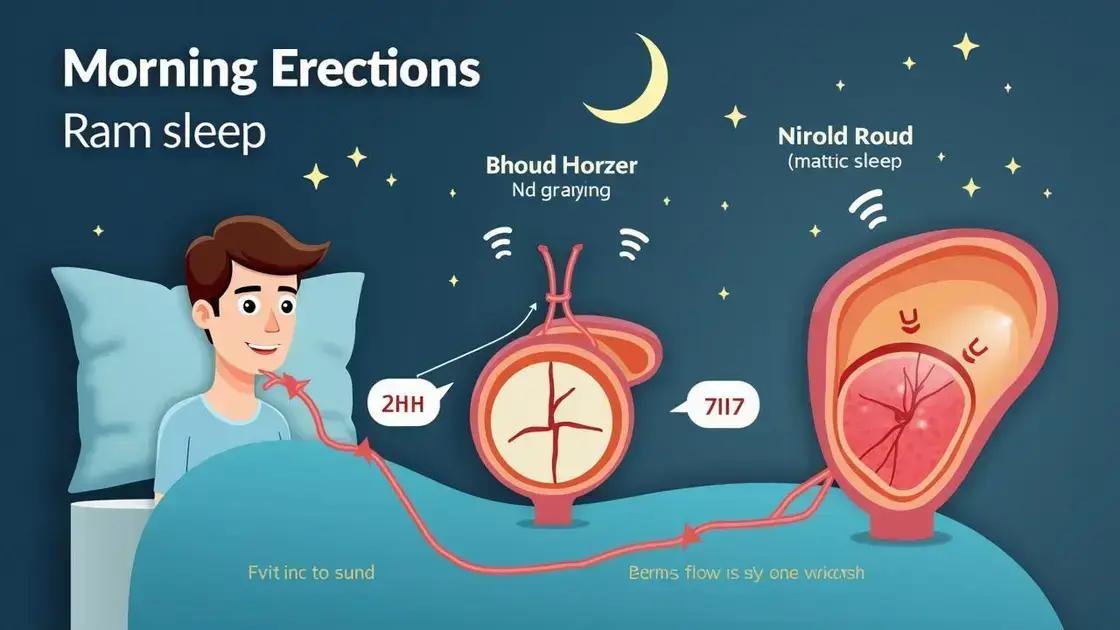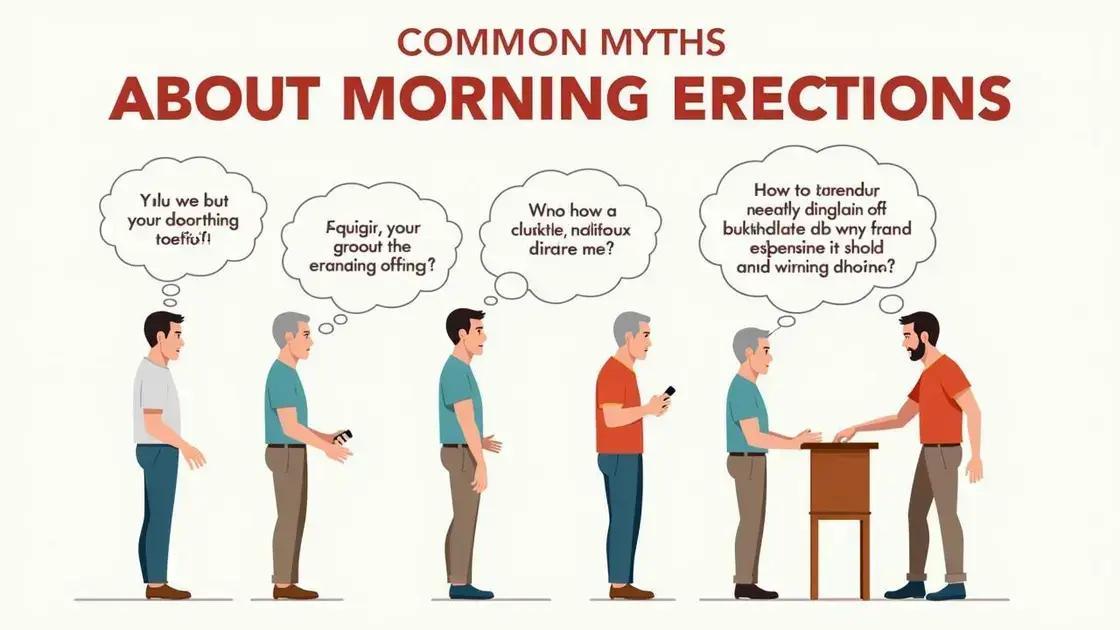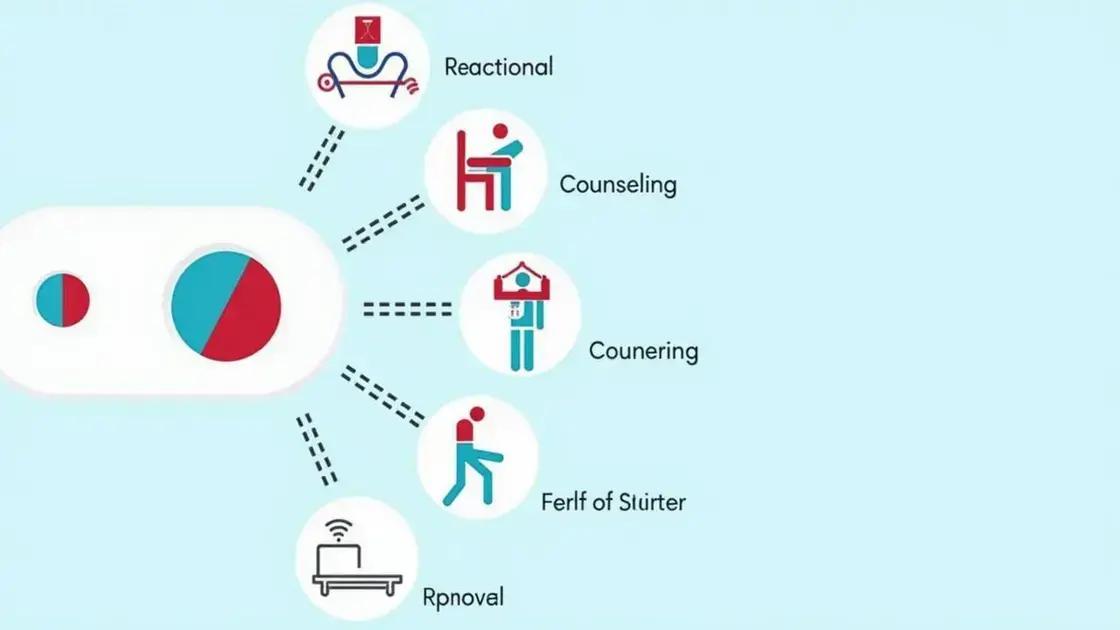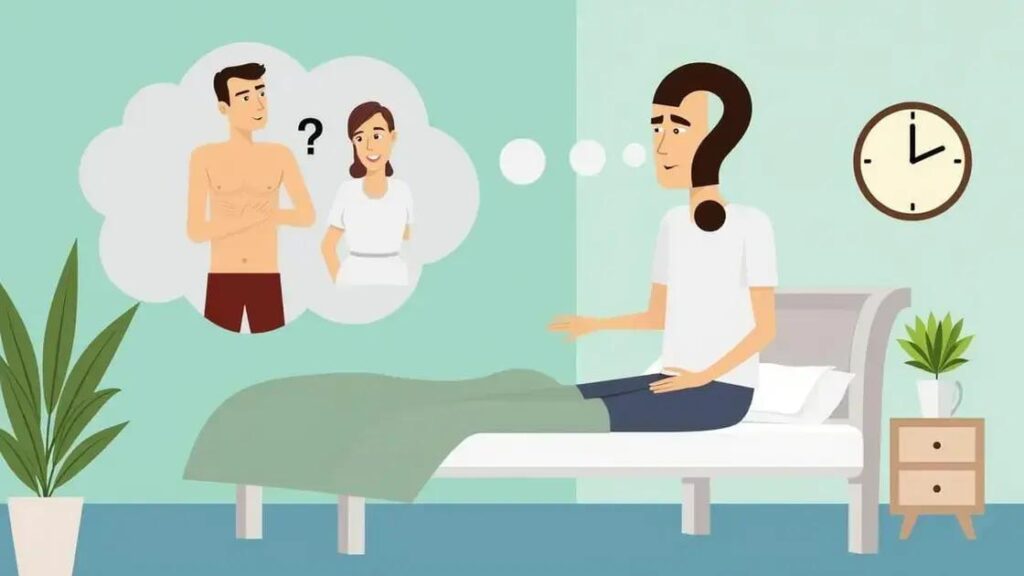Erectile dysfunction (ED) can affect morning erections, but the absence of these erections does not always indicate a problem. Understanding the science behind morning erections and the myths surrounding them, as well as knowing the treatment options available can help men manage ED effectively and improve their sexual health.
Erectile dysfunction (ED) is more than just a physical issue; it can affect a man’s mental health, relationships, and overall quality of life. One common question many men have is: Does erectile dysfunction affect morning erections? Understanding this link is crucial for those experiencing ED and looking for answers. In this article, we’ll explore the nuances of erectile dysfunction, delve into the science behind morning erections, and address common myths surrounding this topic. Whether you’re seeking to understand your own experience or support a loved one, this post will provide valuable insights and guidance.
Understanding Erectile Dysfunction

Erectile dysfunction (ED) is a common condition that affects many men at some point in their lives. It is defined as the inability to achieve or maintain an erection suitable for sexual intercourse. Understanding ED is essential for addressing any concerns about sexual health, including whether it affects morning erections.
Causes of Erectile Dysfunction
ED can result from various factors, which can be broadly categorized into physical and psychological causes. Physical causes include:
- Heart disease
- Diabetes
- Obesity
- High blood pressure
- Nervous system disorders
- Hormonal imbalances
On the other hand, psychological causes can include:
- Stress
- Anxiety
- Depression
- Relationship issues
For some men, a combination of physical and psychological issues may lead to ED.
Impact of Lifestyle Choices
Lifestyle choices can have a significant impact on erectile function. Poor diet, lack of exercise, and substance abuse can all contribute to ED. For example, smoking and excessive alcohol consumption can impede blood flow, making it harder to achieve an erection. Adopting a healthier lifestyle can help improve erectile function.
Risk Factors for Developing ED
Several risk factors are associated with an increased likelihood of developing erectile dysfunction, including:
- Age: ED is more common in older men.
- Chronic health issues: Conditions like diabetes and heart disease elevate risks.
- Medications: Some medications can cause or worsen ED.
- Psychological conditions: Mental health issues can also reduce sexual function.
Importance of Professional Evaluation
If you are experiencing difficulties with erections, it is important to consult a healthcare professional. They can help determine the underlying causes of ED. A proper evaluation may involve a discussion about your medical history, lifestyle habits, and psychological health. Early intervention can lead to better outcomes and quality of life.
The Science of Morning Erections

Morning erections, also known as nocturnal penile tumescence, are a normal part of male physiology. These erections typically occur during sleep and often happen during REM (Rapid Eye Movement) sleep, where most dreaming occurs. Understanding the science behind morning erections can provide insight into sexual health and erectile dysfunction.
Physiological Mechanism
During sleep, especially in REM phases, the body experiences various physiological changes. One crucial change involves increased blood flow to the penis. This happens because neurons in the brain signal the release of nitric oxide, which relaxes blood vessels and allows increased circulation to the penis. This process typically results in spontaneous erections throughout the night.
Frequency and Duration
Men usually experience several erections during a typical night of sleep. It is common to have around 3 to 5 episodes of nocturnal erections, each lasting approximately 25 to 40 minutes. These occurrences help keep the penile tissue healthy by ensuring adequate blood flow.
Connection to Sexual Health
The presence of morning erections is often seen as a sign of healthy erectile function. If a man still experiences these erections despite having erectile dysfunction, it may suggest that the cause of ED is more psychological than physical. This means that issues like anxiety or stress might be affecting performance.
Variations and Changes
As men age, the frequency and intensity of morning erections can change. Factors like hormonal levels, overall health, and lifestyle choices can all influence this phenomenon. For example, men with lower testosterone levels might notice fewer morning erections, which can be an indicator of declining sexual health.
Importance of Monitoring
Monitoring the occurrence of morning erections can provide useful insights into a man’s sexual health. If there is a noticeable decrease or absence of morning erections, it may be wise to consult a healthcare professional. This can help identify underlying issues related to erectile dysfunction or other health concerns.
How ED Impacts Sexual Performance

Erectile dysfunction (ED) can significantly impact sexual performance, creating a ripple effect that extends beyond just the act of intercourse. Understanding how ED affects overall sexual health is important for both individuals and their partners.
Physical Performance
When a man experiences ED, it can be difficult to achieve or maintain an erection. This physical limitation can lead to frustration during sexual activity. In many cases, men may find themselves unable to engage in sexual relations, leading to feelings of inadequacy or embarrassment. This impact can alter the dynamics of intimacy between partners.
Psychological Effects
The psychological consequences of ED are substantial. Men may experience anxiety, depression, or decreased self-esteem when facing challenges in their sexual performance. These feelings can create a cycle of anxiety, leading to further difficulties in achieving an erection. This situation not only affects the individual but can also strain relationships.
Impact on Relationship Dynamics
ED may change the way partners interact with each other. Open communication is essential, but many men feel embarrassed to discuss their difficulties with their partner. This silence can lead to misunderstandings, harbor resentment, and ultimately damage trust within the relationship. Encouraging supportive dialogue is crucial in managing this condition together.
Shifts in Sexual Activities
While penetration may become challenging, couples can find alternative ways to express intimacy and pleasure. Exploring different forms of sexual activity can strengthen the bond between partners and maintain a fulfilling sexual relationship. This adaptability can help mitigate feelings of loss or failure associated with ED.
Seeking Help
Recognizing the impact of ED on sexual performance is the first step toward addressing the issue. Many effective treatment options are available, from medication to counseling. Seeking help early can lead to better outcomes and a healthier sexual relationship.
Common Myths About Morning Erections

There are many myths surrounding morning erections, which can lead to misunderstandings about male sexual health. It’s important to distinguish fact from fiction to promote a better understanding of this natural phenomenon.
Myth 1: Morning Erections Only Happen to Young Men
Many people believe that morning erections are something that only young men experience. In reality, men of all ages can have morning erections. Although the frequency may decrease with age due to hormonal changes, it is still a normal occurrence for older men.
Myth 2: Lack of Morning Erections Means Erectile Dysfunction
Some men worry that not having morning erections is a clear sign of erectile dysfunction (ED). While the presence of morning erections can indicate healthy erectile function, an absence does not automatically mean there’s a problem. Various factors, including sleep patterns and stress levels, can influence nocturnal erections.
Myth 3: Morning Erections Are Always a Sign of Sexual Arousal
Many assume that morning erections occur solely because of sexual dreams or arousal. However, these erections are typically a part of the body’s natural sleep cycle and do not always indicate sexual desire or fantasies.
Myth 4: Everyone Has Morning Erections
While it is common for many men to have morning erections, not all men experience them regularly. Factors like medication, health conditions, or lifestyle choices can impact the occurrence of morning erections.
Myth 5: Morning Erections Are Not Important
Some people think that morning erections are trivial or unimportant, but they actually serve a purpose. These erections help maintain the health of penile tissues by ensuring proper blood flow, which is essential for erectile function.
Seeking Help: Treatment Options for ED

If you or someone you know is facing erectile dysfunction (ED), seeking help is a vital step toward recovery. There are several treatment options available that can help improve sexual health and restore confidence.
Consultation with a Healthcare Professional
The first step in addressing ED is consulting a healthcare provider. They can conduct a thorough evaluation to determine the underlying causes of the condition. This may involve discussing medical history, lifestyle factors, and performing relevant tests.
Medications
There are several medications commonly prescribed for ED. These drugs work by increasing blood flow to the penis, making it easier to achieve and maintain an erection. Some popular options include:
- Sildenafil (Viagra)
- Tadalafil (Cialis)
- Vardenafil (Levitra)
- Avanafil (Stendra)
These medications are typically taken before sexual activity, and their effects can last from a few hours to over a day, depending on the type.
Counseling and Therapy
In many cases, psychological factors contribute to ED. Therapy can help address issues such as anxiety, depression, or relationship problems. Talking to a trained counselor or therapist can provide support and strategies to overcome these hurdles.
Lifestyle Changes
Making healthy lifestyle changes can have a positive impact on erectile function. Consider the following:
- Diet: Eating a balanced diet rich in fruits, vegetables, whole grains, and lean proteins.
- Exercise: Regular physical activity can help improve blood flow and overall health.
- Avoiding tobacco and limiting alcohol: Both can negatively affect erectile function.
Other Treatment Options
If medications and lifestyle changes do not work, other treatment options are available. These may include:
- Pumps: Vacuum erection devices create suction to increase blood flow to the penis.
- Injections: Medications can be injected directly into the penis to help achieve an erection.
- Implants: Surgical options like penile implants may be suitable for some men.
Each treatment option has its pros and cons, so it’s crucial to discuss these with a healthcare provider to determine the best approach based on individual needs and circumstances.
In Summary: Understanding ED and Its Implications
Erectile dysfunction (ED) is a common issue that can affect men of all ages, significantly impacting sexual performance and overall quality of life. Recognizing the causes and effects of ED is crucial for addressing the problem effectively.
Morning erections can hint at the underlying health of a man’s erectile function and can influence self-esteem and intimate relationships. It’s important to understand the science behind these phenomena and the common myths associated with them.
Seeking help is a vital step, with numerous treatment options available ranging from medications to lifestyle changes and counseling. By addressing both physical and psychological aspects, men can regain confidence and improve their sexual health.
Ultimately, open communication and a proactive approach to seeking help can lead to successful management of ED and foster healthier relationships.
FAQ – Frequently Asked Questions About Erectile Dysfunction and Morning Erections
What is erectile dysfunction?
Erectile dysfunction (ED) is the inability to achieve or maintain an erection suitable for sexual intercourse.
Does erectile dysfunction affect morning erections?
Yes, ED can impact morning erections. However, the absence of morning erections does not always indicate ED.
What causes morning erections?
Morning erections, also known as nocturnal penile tumescence, are caused by increased blood flow during REM sleep.
Are morning erections important?
Yes, morning erections play a role in maintaining penile health by ensuring adequate blood flow to the tissue.
What are the common myths about morning erections?
Common myths include that only young men experience them, and that a lack of morning erections always means ED.
What treatment options are available for ED?
Treatment options include medications, therapy, lifestyle changes, and other interventions such as vacuum pumps or injections.













